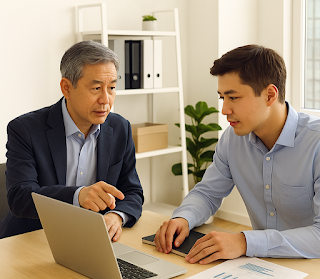Why Koreans Value Age and Hierarchy | Social Norms vs American Culture
Why Koreans Value Age and Hierarchy | Social Norms vs American Culture In Korea, age isn’t just a number - it’s a roadmap for how people interact in almost every social setting. If you’ve ever visited Korea or watched a Korean drama, you might have noticed how often people ask, “How old are you?” It might seem unusual to Americans, but there’s a deep cultural reason behind it.
The Importance of Age in Korean Society
In Korean culture, age determines how you speak to someone, how you behave, and even how you address them. There are different levels of speech called honorifics, and using the correct one shows respect. Forgetting to use them can seem rude or even offensive. For Americans, who are used to casual conversations regardless of age, this can be surprising.
This respect for age and hierarchy goes beyond just language. In workplaces, younger employees often defer to their seniors, even outside of work hours. Friendships can also follow age-based dynamics. For example, the older friend might naturally take the lead when making plans or offering advice.
Why This Surprises Americans
In the U.S., there’s a strong belief in equality. Whether you’re a CEO or a new employee, using first names and speaking casually is normal. Many Americans value independence and see age as less important in shaping relationships. So, when they encounter Korea’s respect-based hierarchy, it can feel formal or even restrictive.
Modern ChangesI remember one time I brought a Korean friend to a church group potluck. He kept bowing and talking super politely to everyone—even to people way younger than him. A few of my American friends later asked, “Is he okay? Why is he acting like we’re his teachers?”
That’s when I realized how different it feels. In Korea, we’re just used to showing that kind of respect to anyone older. Even now, I still feel a little weird calling someone older by their first name, even if they tell me it’s fine. And disagreeing with someone older? Ugh… that’s hard!
Living in the U.S. has definitely made me more relaxed, but I still have that Korean part of me that says, “Let them speak first. Don’t interrupt. Be polite.” It’s like living with two cultural brains—but I kinda love it. It keeps life interesting.
That said, things are changing. Younger Koreans, especially in big cities, are blending traditional respect with more casual, Western-style interactions. It’s common now to see younger professionals challenging strict hierarchies, especially in start-up companies and creative industries.
Why This Matters
Understanding these cultural differences can prevent misunderstandings and foster better communication. Age and hierarchy might seem outdated to some, but in Korea, they reflect a deep value for respect, community, and social harmony.
"So next time someone asks your age in Korea, don’t be too surprised. In my opinion, they’re just trying to figure out the best way to show you respect."
"If you enjoyed this post, you might also like: Why Koreans Take Off Shoes Indoors."





Comments
Post a Comment